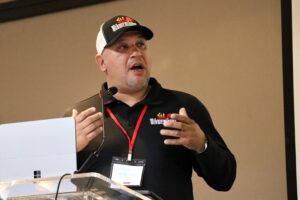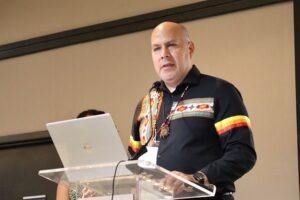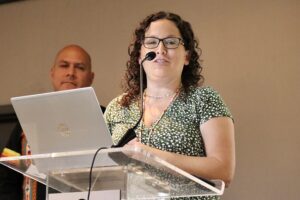Business Development Panel highlights Indigenous Tourism during economic development forum

By Rick Garrick
SAULT STE. MARIE — Emerging opportunities across multiple sectors were highlighted during the Business Development Panel presentation on Oct. 25 at the inaugural annual Anishinabek Nation Economic Development Opportunities Forum 2023. The Forum was hosted by the Anishinabek Nation Economic Development Department from Oct. 24-26 at the Quattro Hotel and Conference Centre in Sault Ste. Marie, Ont., to showcase its initiatives and those of its member nations, provide actionable insights and calls to action, and highlight policies and funding opportunities from Ontario and Canada.
“Our approach … has been about destination development, which then turned into business development,” says Luke Wassegijig, manager at Wikwemikong Tourism. “Hearing the presentation yesterday about telling our story, I wanted to make sure that we tell our story and tell our story through our lens because again, through colonialism, through Residential School, it’s important to know the work we do is about changing a colonial narrative and we do it through Indigenous tourism.”
Wassegijig says their mission and vision has been to build a foundation for sustainable tourism development that will position Wiikwemkoong as a four-season destination.
“We’re doing that by developing quality market-ready products, services, and events that will support the growth of the Indigenous tourism on Manitoulin Island and Killarney,” Wassegijig says. “In this post-COVID world and post-Kamloops world, we have found so many domestic travellers that were looking for a genuine experience and really looking for a genuine way to reconcile, so what we did is started creating programs around that. With our experiential tourism programs, it’s absolutely not about commodifying our culture. For us, it’s about changing that colonial narrative, and changing that colonial narrative through Indigenous tourism is the best way of doing it because it’s an opportunity for you to tell your stories, it’s an opportunity for Indigenous youth to reclaim those stories, reclaim that culture, reclaim that language, and reclaim their connection to the land.”

Steven Debassige, cultural integrity lead at Indigenous Tourism Ontario (ITO), says ITO is the province’s first and only dedicated Indigenous tourism organization that supports economic stability for communities through experiential tourism.
“As Luke pointed out, the opportunities are vast across not just Anishinabek Nation but across the province about being able to help support communities and businesses and entrepreneurs to share their stories, share their passions, and explain what it is we do as Anishinabek people and sharing that with the global population,” Debassige says, noting that ITO’s four pillars are cultural authenticity, marketing and branding, workforce development, and product development. “Every conference that we attend we try to bring someone within our member organization to help elevate their platform and share their experience with the audience.”

Jennifer King-Callon, Indigenous business advisor at ITO, says ITO has five business advisors located across the province who provide a range of programs and workshops.
“There are opportunities with being an ITO member — we have the opportunity to bring in film crews,” King-Callon says. “This specific picture is Ojibway Park in Garden River First Nation, they have done some wonderful work on the beachfront, the cabins, the park itself, as well as the trails. They have a beautiful medicine trail so we had the opportunity on October 1st to bring a very large crew through so they could tell their story back from the 1950s when they started their park right through to the opportunities they have today. This one specific picture will be coming out as a Destination Ontario marketing promotion.”
The Business Development Panel presentation also featured Kathy Mair, chief commissioner of the Six Nations Cannabis Commission, who spoke about the Six Nations Cannabis Control Law and Regulations, and Barry Payne, founder of Adirondack Technologies Furniture Inc., who spoke about assisting Indigenous organizations and communities on bidding on federal contracts and the procurement process.


